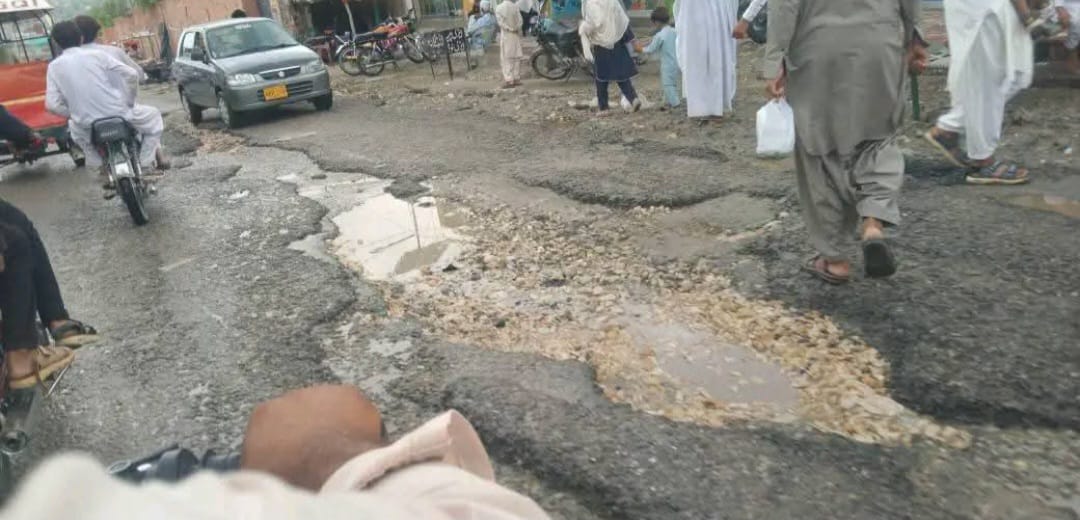𝑺𝒂𝒍𝒆𝒆𝒎 𝑩𝒖𝒌𝒉𝒂𝒓𝒊
Takht-e-Nasrati: the image of a thriving sub-divisional headquarters—a hub of progress, bustling markets, paved roads, and citizens living with dignity. Yet the reality is starkly different. This town, like many on the margins of governance, stands as a mirror reflecting years of neglect, mismanagement, and the betrayal of public trust.
The recent rains have laid bare the scale of this neglect. The Main Bazaar Road, once the lifeline of Takht-e-Nasrati economic and social activity, is now a scarred landscape. The downpour has eroded its very foundation, leaving behind gaping craters that threaten the safety of every commuter. The faint traces of its former asphalt surface serve as a cruel reminder of what once was. It is as if the earth itself has split open in silent protest against the apathy of those who claim to lead.
But the disrepair of a single road is merely the most visible symptom of a deeper malaise. Much of Takht-e-Nasrati continues to grapple with a severe shortage of water. Taps often run dry, and when water does flow, it is scarcely enough to meet basic household needs. This scarcity disrupts every aspect of daily life. Families ration water to an extent that hygiene and health are compromised, and tempers flare as even the smallest requirements become a struggle.
The education sector fares only marginally better. Schools exist, and enrollment is relatively stable, yet the absence of modern facilities hampers meaningful learning. Classrooms are overcrowded and furnished with broken desks; libraries remain locked, and laboratories are either under-equipped or nonexistent. Though teachers are present, they lack access to contemporary training and resources. The result is an education system that produces compliance, not critical thinking.
Healthcare facilities are virtually nonfunctional. Type C Government hospital, in name alone, are reduced to hollow structures where patients rarely find the care they need. Essential medicines are frequently unavailable, and doctors—when present—are overwhelmed by the patient load. Families are forced to travel to distant cities such as Peshawar or Bannu for even minor treatments, a burden that drives many into debt.
The deterioration of law and order adds yet another layer of hardship. What was once a region known for its relative safety is now gripped by fear. Residents leave their homes uncertain if they will return unharmed, as theft and violent crime have become an unsettling norm. Police forces exist more on paper than on the ground, further deepening the public’s sense of abandonment.
Amid this reality, Takht-e-Nasrati’s elected representatives continue to boast of development achievements. The Member of National Assembly (MNA) routinely claims to have completed “the largest development projects in history,” yet these projects are invisible to the very people they were meant to serve. Broken roads, failing infrastructure, and lives lived in darkness stand in sharp contrast to these hollow declarations.
The Member of Provincial Assembly (MPA) offers little solace. Instead of being a voice for the people, he behaves like a patron bestowing favors rather than fulfilling responsibilities. Genuine questions from constituents are often met with indifference, evasive answers, or empty promises.
This political apathy has planted seeds of frustration among the people of Takht-e-Nasrati, though for now, they remain silent. But how long can this silence last? Are these citizens expected only to appear on election day, their role confined to casting votes? Do they not deserve the same dignity and basic services available in other constituencies?
The revival of Takht-e-Nasrati demands urgent, tangible action. Roads must be rebuilt, water supply systems upgraded, and electricity and gas delivered to every household. Health and education facilities must be strengthened—not as abstract items in government budgets but as visible realities on the ground. Access to these services is not a privilege; it is a fundamental right.
If those in power are unwilling or unable to deliver, the citizens of Takht-e-Nasrati must recognize the strength they hold. A vote is not a token; it is the single most powerful tool for accountability. It can alter the trajectory of communities and entire nations. Misplaced, it perpetuates deprivation. Used wisely, it can end it.
The people must now ask hard questions: Where have development funds been spent? Why have promises gone unfulfilled? What evidence is there of progress? As long as the public remains silent, politicians will continue to exploit their hardships as political capital.
Takht-e-Nasrati stands at a crossroads. Its people must choose whether to remain voiceless, as they have in the past, or rise to claim their future. If they unite and demand their rights, change will follow.
This town stands at the altar of betrayed hopes, yet the flame of possibility has not been extinguished. That flame will burn brighter the day Takht-e-Nasrati children walk into fully equipped schools, when clean water flows freely into every home, when hospitals treat rather than turn away patients, and when peace replaces fear. On that day, Takht-e-Nasrati will finally be the sub-divisional headquarters it was meant to be—a place its people can be proud of.

